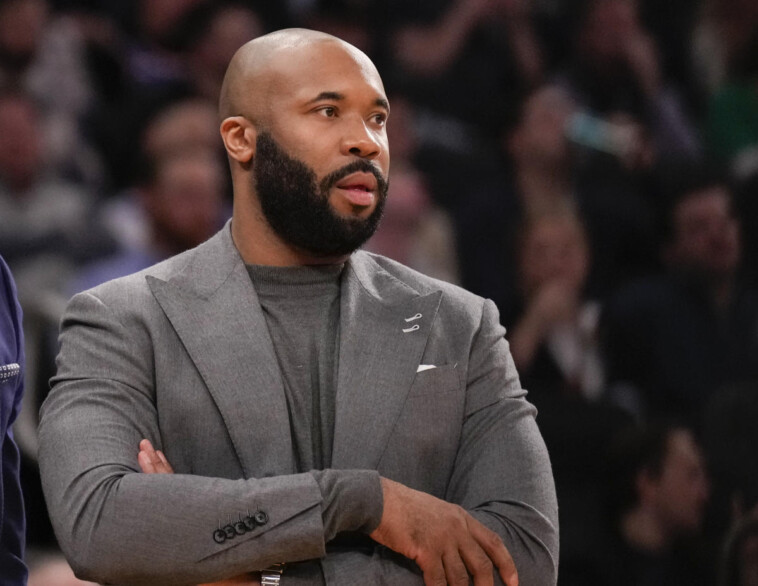The chants echoed through Hagan Arena on Tuesday night with the home team seconds away from closing out an 83-76 victory over Villanova.
“Thank you, Neptune! Thank you, Neptune!” the Saint Joseph’s student section mockingly sang at Villanova’s embattled men’s basketball coach.
This was another new low for Kyle Neptune after two-plus years of plunging Villanova basketball from the top of the sport to the depths of mediocrity. This was the moment where Neptune’s seat went from hot to scorching, where it became difficult to envision a scenario where he regains the trust of Villanova’s donors and ticket buyers and earns another season.
A Villanova program that missed the NCAA tournament in both of Neptune’s first two seasons has opened his third year in exactly the way that he couldn’t afford. The Wildcats have dropped two of their opening four games, the defeat at Saint Joseph’s coming less than a week after a disastrous home loss to Columbia.
Under Neptune, Villanova has now lost eight times in two-plus seasons against teams ranked outside the KenPom top 100. Jay Wright suffered two such losses in his final nine seasons as head coach of the Wildcats.
That Villanova has fallen this far this quickly is an indictment of Neptune given the state of the program when Wright abruptly retired shortly after the 2022 Final Four. Villanova was then at its apex, having captured the 2016 and 2018 national championships, won at least a share of seven of the previous nine Big East regular-season titles and sent a slew of impact players to the NBA.
Neptune was an unproven but logical choice to succeed Wright because of his deep ties to the Villanova program. He had spent eight seasons as an assistant coach under Wright before leaving to become Fordham’s head coach for a single season. Many of the veterans on Villanova’s roster were players that Neptune had recruited.
“My role now is a standard bearer for Villanova basketball,” Neptune said during his April 2022 introductory news conference. “My job now is to make sure we keep this culture together, make sure we hold this high standard of what Coach [Wright] has created here.”
The program that Neptune inherited was as close to turnkey as it gets in college basketball’s NIL and transfer portal era. Four of Villanova’s top six players returned from the previous year’s 30-win Final Four team. The Wildcats also retained all three of Wright’s top recruits — five-star future NBA Draft pick Cam Whitmore and four-star prospects Mark Armstrong and Brandon Hauser.
The standard that Wright set at Villanova was impossibly high, but Neptune hasn’t come close to maintaining it. In his debut season, Villanova stumbled to a 17-17 record, finished sixth in the Big East and lost to Liberty in the opening round of the NIT.
Armed with ample NIL money to replenish his roster that offseason, Neptune added a quartet of transfers to complement returners Armstrong, Eric Dixon and Justin Moore. The investment didn’t pay off as Villanova again sputtered to a sixth-place finish in the Big East and again lost in the opening round of the NIT.
Though Neptune endured sporadic boos and heckling at the end of last season, athletic director Mark Jackson gave him a public vote of confidence the day after the NIT loss. Jackson has since left for the same job at Northwestern, leaving the future of Villanova’s men’s basketball program in the hands of his yet-to-be-named successor.
Little that has happened since has helped Neptune’s standing.
Preseason expectations were modest for Villanova even after the Wildcats retained Dixon for a fifth season and added transfer Wooga Poplar from Miami and Jhamir Brickus from La Salle. The Wildcats were picked seventh in the Big East preseason poll, ahead of only the likes of Butler, Georgetown, Seton Hall and DePaul.
The outlook has grown even more pessimistic with the two early season losses. Columbia has been a perennial also-ran in the Ivy League and was KenPom’s preseason 217th-ranked team. Saint Joseph’s is expected to contend in the A-10 this season but was days removed from a home loss to Central Connecticut.
What was especially disconcerting about the Saint Joseph’s loss was that it was hard to tell which was the Big East roster and which was the A-10 one. Six-foot-9 Saint Joseph’s forward Rasheer Fleming was often the best player on the floor and the Hawks’ guards were quicker and more explosive than Villanova’s.
On offense, Villanova is often too stagnant and easy to guard. On defense, Villanova surrenders too many transition opportunities and its switching scheme doesn’t appear to fit the Wildcats’ slow-footed personnel. Even Villanova’s execution of the basics leaves a lot to be desired, as evidenced by the Wildcats twice surrendering fast-break dunks in the final 40 seconds in situations that called for them to extend the game by fouling.
While the new season is only nine days old, Villanova faces an steep climb to try to get back to the NCAA tournament.
Villanova needs to avoid any further damaging non-conference losses and pick up at least a marquee non-league win or two against the likes of Virginia, Maryland and Cincinnati. Otherwise the Wildcats might need to crack the top three in the Big East to contend for an NCAA bid, and it’s almost impossible to see this pedestrian roster coming close to that.
The sirens were already sounding the past two seasons that Neptune wasn’t the right choice to succeed Wright at Villanova.
If he misses the NCAA tournament for a third straight time this March, Neptune shouldn’t get another chance.


